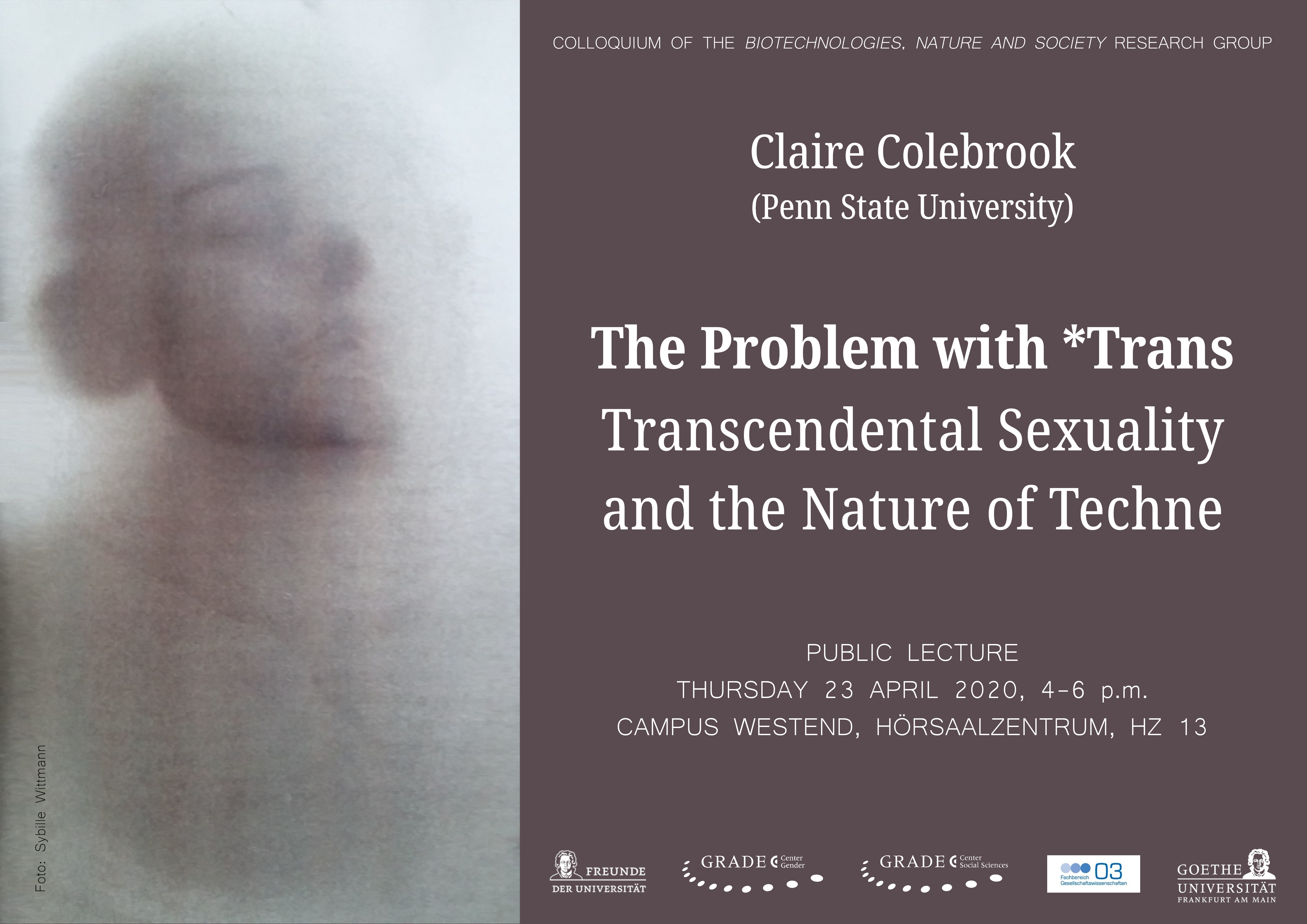2020
Neue Beiträge von Thomas Lemke
Lemke, T. (2020). Gouvernementalität. In: Kammler, C., Parr, R. & Schneider, U. J. (Hg.), Foucault-Handbuch. Leben – Werk – Wirkung, Stuttgart/Weimar: J. B. Metzler, 2., aktualisierte und erweiterte Auflage, 303-305.
Lemke, T. (2020). Governmentality Studies. In: Kammler, C., Parr, R. & Schneider, U. J. (Hg.), Foucault-Handbuch. Leben – Werk – Wirkung, Stuttgart/Weimar: J. B. Metzler, 2., aktualisierte und erweiterte Auflage, 437-441.
Prof. Dr. Thomas Lemke ist für 3 Jahre in den Bioökonomierat der Bundesregierung berufen worden. Das neue Beratungsgremium wird Empfehlungen und Stellungnahmen erarbeiten und die Förderung der öffentlichen Debatten zur Bioökonomie voran bringen. Zu den Aufgaben wird auch gehören, in einem partizipativen Prozess Vorschläge und Empfehlungen für einen Umsetzungsplan der Nationalen Bioökonomiestrategie zu entwerfen.
Artikel von Viona Hartmann und Katharina Hoppe
Hartmann, Viona und Katharina Hoppe (2020): Ecofeminist Futures. On Politicizing Necessity. engagée 9: 47-51.
http://www.engagee.org/index.html
Interview mit Susanne Schultz
Zum 60-jährigen Bestehen diskutiert Susanne Schultz die pharmazeutischen, bevölkerungs- und sexualpolitischen Hintergründe der Anti-Baby-Pille: „Die Pille war kein emanzipatorisches Projekt“, Interview mit Susanne Schultz in der taz am 15./16. August 2020, S. 20-21.
Stellenausschreibung am Arbeitsschwerpunkt „Biotechnologie, Natur und Gesellschaft"
Am Fachbereich Gesellschaftswissenschaften der Johann Wolfgang Goethe-Universität Frankfurt am Main ist beim Institut für Soziologie zum 15.09.2020 die Stelle für eine*n Wissenschaftliche*n Mitarbeiter*in (m/w/d) (E13 TV-G-U, halbtags) zunächst befristet für die Dauer von drei Jahren zu besetzen (mit der Option auf Verlängerung um weitere zwei Jahre). Die Eingruppierung richtet sich nach den Tätigkeitsmerkmalen des für die Goethe-Universität geltenden Tarifvertrages (TV-G-U).
Aufgabengebiet
Unterstützung der Forschung und Lehre am Arbeitsschwerpunkt „Biotechnologie, Natur und Gesellschaft“; Betreuung und Prüfung der Studierenden sowie Mitwirkung bei administrativen Aufgaben; Pflege inner- und außeruniversitärer Arbeitszusammenhänge und Engagement in Forschungsnetzwerken; Transfer von Forschungsergebnissen; Entwicklung eines Dissertationsvorhabens.
Einstellungsvoraussetzungen
Vorausgesetzt wird ein sehr gut abgeschlossenes wissenschaftliches Hochschulstudium (Master oder vergleichbar) in Soziologie oder in verwandten Disziplinen. Gefordert sind ausgewiesene Kenntnisse der interdisziplinären Wissenschafts- und Technikforschung (science and technology studies). Erwartet werden darüber hinaus die Fähigkeit zu selbstbestimmter Forschung und eigenständigem wissenschaftlichem Arbeiten sowie Teamorientierung und die sehr gute Beherrschung der englischen Sprache. Erwünscht ist ein Interesse an bioökonomischen Fragestellungen.
Bewerbungen mit den üblichen Unterlagen (aussagefähiges Anschreiben, Lebenslauf, Zeugniskopien) sind elektronisch unter Angabe der Kennziffer 13/2020 bis zum 29.06.2020 zu richten an die Dekanin des Fachbereichs Gesellschaftswissenschaften der J.W. Goethe-Universität, Mailadresse: dekanat.fb03-bewerbungen@soz.uni-frankfurt.de.
Neuer Artikel von Márcio Vilar
| The chemical substance synthetic phosphoethanolamine (fosfoetanolamina sintética) was developed at the University of São Paulo (USP) in Brazil at the beginning of the 1990s and, until 2014, was tested on and distributed to cancer patients by members of USP's Chemistry Institute (IQSC) in the city of São Carlos. That year, the production and distribution of 'Fosfo', as it became popularly known, was forbidden by IQSC's director with the support of USP's rector and the Brazilian National Sanitary Surveillance Agency (ANVISA). Shortly after this first prohibition, however, Fosfo gained popularity and became a national symbol of local scientific innovation and hope for a cancer cure. Likewise, it became an object of regulatory disputes involving multiple sectors of Brazilian society. |
Despite several further efforts by some scientists and patients to legitimate Fosfo as a pharmaceutical, ANVISA never authorized it. Nevertheless, at the same time as parts of Brazil's established medical communities were becoming suspicious of Fosfo, its informal production and dissemination were increasing surreptitiously, with many Fosfo users and stakeholders questioning the legitimacy of conventional cancer therapies.
In this article, Márcio Vilar aims to understand the impact of Fosfo as a biotechnological innovation in terms of the 'transfiguration' of the physical and juridical persons involved in this controversy. Through the lens of transfiguration, the engagement and therapeutic-regulatory experiences of Fosfo users and stakeholders appear as deviant journeys that introduce discontinuities into established biomedicine and imply radical transformations at multiple levels, ranging from individuals to larger institutional environments.
Vilar, Márcio (2020): Following 'Fosfo': Synthetic Phosphoethanolamine and the Transfiguration of Immunopolitics in Brazil. Medicine Anthropology Theory. Special section on 'Rethinking Sociality and Health: Transfigurations of Bodies, Practices, and Policies in an Interconnected World'. (eds.) Brigit Obrist, Dominik Mattes & Bernhard Hadolt, 7(1): 87-116.
*ENTFÄLLT aus gegebenem Anlass*: Gastvortrag von Claire Colebrook (Pennsylvania State University) am 23.04.2020
 |
In her lecture, Claire Colebrook pursues the following four questions:
|
- If modern philosophy is defined as a form of anti-foundationalism,
or a suspension and bracketing of the world, to what extent do
new materialisms require a marriage between politics and nature? - Is nature always technical?
Claire Colebrook is Edwin Erle Sparks Professor of English, Philosophy, and Women's, Gender, and Sexuality Studies at Penn State University (Pennsylvania, USA). She wrote numerous articles and books on the works of Gilles Deleuze, on sexual difference, feminist ethics and representation as well as on the philosophy of feminist new materialisms. More recently, she has been engaged with climate change and extinction, as well as theorizing the future(s). Together with Tom Cohen, she is the editor of the Critical Climate Change Book Series at Open Humanities Press. She recently completed two books on Extinction for Open Humanities Press: The Death of the Posthuman, and Sex After Life, and has co-authored with Tom Cohen and J. Hillis Miller) Twilight of the Anthropocene Idols (Open Humanities Press, 2016). Currently, she is working a book on the fragility of the species, the archive, and the earth.
Der Gastvortrag findet am Donnerstag, den 23. April 2020 um 16 Uhr c.t., im Hörsaalzentrum, Raum HZ 13, statt.
KONTAKT
Prof. Dr. Thomas Lemke
Goethe-Universität Frankfurt am Main
Fachbereich 03 Gesellschaftswissenschaften
Institut für Soziologie
Schwerpunkt Biotechnologie,
Natur und Gesellschaft
Besucheradresse
Theodor-W.-Adorno-Platz 6
Campus-Westend – PEG-Gebäude
Raum 3.G 027
60323 Frankfurt am Main
Postadresse
Campus Westend
PEG - Hauspostfach 31
60629 Frankfurt am Main
Tel. +49 69 798 36664
lemke@em.uni-frankfurt.de
KONTAKT
Office Management
Angelika Boese
Raum PEG 3.G 030
Tel. +49 69 798 36518
boese@soz.uni-frankfurt.de
- Aktuelles und Presse
- Pressemitteilungen
- Öffentliche Veranstaltungen
- Uni-Publikationen
- Aktuelles Jahrbuch
- UniReport
- Forschung Frankfurt
- Aktuelle Stellenangebote
- Frankfurter Kinder-Uni
- Internationales
- Outgoings
- Erasmus / LLP
- Goethe Welcome Centre (GWC)
- Refugees / Geflüchtete
- Erasmus +
- Sprachenzentrum oder Fremdsprachen
- Goethe Research Academy for Early Career Researchers
- Forschung
- Research Support
- Forschungsprojekte, Kooperationen, Infrastruktur
- Profilbereich Molecular & Translational Medicine
- Profilbereich Structure & Dynamics of Life
- Profilbereich Space, Time & Matter
- Profilbereich Sustainability & Biodiversity
- Profilbereich Orders & Transformations
- Profilbereich Universality & Diversity







